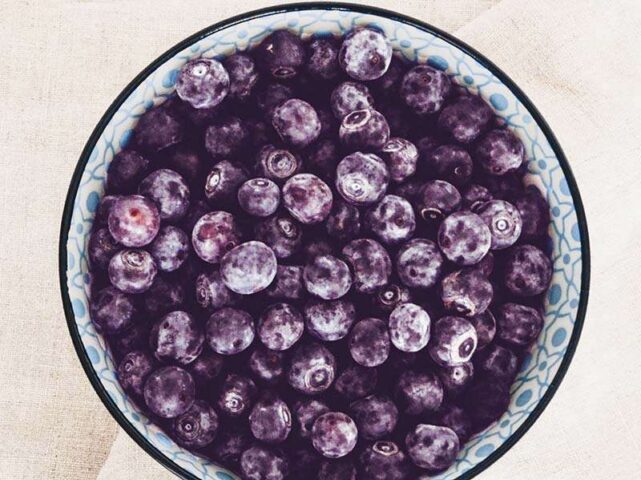Vitamins and Minerals: Natural Allies Against Migraine Pain

by Lauren Licatesi, MS, RD
Did you know migraines are the leading cause of disability worldwide? Approximately 15% of individuals in the United States experience migraine attacks that significantly limit daily activities and adversely affect quality of life. Migraines are also known as the most common primary headache in children and adolescents, with a prevalence as high as 10%. They are also reported to be three times more likely in women than in men. Recently, increased oral intake and dietary supplements have shown promising effects on migraine symptoms and a quality of life. Here are three vitamins/minerals to help reduce your migraine pain.
Magnesium
Magnesium is a nutrient in the body that is important for many processes including regulating muscle and nerve function, blood sugar levels, and blood pressure and making protein, bone, and DNA. Magnesium has been shown to decrease migraines by reducing the level of circulating calcitonin gene-related peptide (CGRP), which is involved in migraine pathogenesis through its ability to dilate intracranial blood vessels and reduce nociceptive stimuli.
The best way to increase your magnesium intake is through oral nutrition. Magnesium is found in many foods we eat such as rolled oats, spinach, chia seeds, low fat milk, yogurt, soybeans, baked beans, lentils, almonds, and cashews.
If you are magnesium deficient, supplementation can also be an option. Research shows that magnesium oxide is the most effective form of magnesium to prevent migraine, usually at a dose of 400-600 mg per day. Not only is it inexpensive, but it does not require a prescription, and can be found at most grocery stores or pharmacies.
Vitamin D
Inflammation plays a key role in migraines, where inflammatory substances produced by mast cells, mostly in the meninges, can activate the trigeminal nerve, a main structure involved in a migraine headache. Vitamin D’s role has shown to reduce that inflammation, leading to a decrease in migraines.
Although we can get vitamin D from the sun, vitamin D is also found in foods such as cod liver, salmon, swordfish, tuna fish, orange juice with fortified vitamin D, dairy and plant milk with fortified vitamin D, sardines, and beef liver.
If you are vitamin D deficient, research shows that’s taking 1000-4000 IUs of vitamin D per day, as well as consumption of vitamin D rich foods, can significantly decrease the duration, frequency, and severity of migraine headaches.
Zinc
Zinc is a nutrient found throughout your body that aids in the creation of DNA, growth of cells, building proteins, healing damaged tissue, and supporting a healthy immune system. Not only is it crucial for our survival, but it’s also an essential trace element with antioxidant and anti-inflammatory properties. It plays an important role in neuronal signaling and is also known as a cofactor for antioxidant enzymes. Given the inflammatory nature of migraines and contributing the oxidative stress in this disorder, zinc can have favorable effects on migraine attacks.
Foods rich in zinc include oysters, red meat, poultry, beans, nuts, crab, lobster, whole grains, breakfast cereals, and dairy products.
If you are zinc deficient, supplementation on top of oral nutrition is recommended. A recent study published in 2023 examined more than 11,000 American adults and found those whose diet included 15.8 milligrams or more of zinc a day had a lower risk of migraines, compared with those who consumed 5.9 milligrams or less a day.
If you or a loved one are dealing with migraine headaches, incorporating foods rich in magnesium, vitamin D, and zinc, as well as supplementation can be extremely helpful in reducing the frequency and severity of migraine pain.
References:
Ahmadi, H., Mazloumi-Kiapey, S. S., Sadeghi, O., Nasiri, M., Khorvash, F., Mottaghi, T., & Askari, G. (2020). Zinc supplementation affects favorably the frequency of migraine attacks: A double-blind randomized placebo-controlled clinical trial. Nutrition Journal, 19(1). https://doi.org/10.1186/s12937-020-00618-9
American Migraine Foundation. Spotlight on: Nutraceuticals. (2020, June 15). Retrieved September 27, 2022, from https://americanmigrainefoundation.org/resource-library/nutraceuticals/
Ariyanfar, S., Razeghi Jahromi, S., Togha, M., & Ghorbani, Z. (2022). Review on headache related to dietary supplements. Current Pain and Headache Reports, 26(3), 193–218. https://doi.org/10.1007/s11916-022-01019-9
Cottrell, C. K., Drew, J. B., Waller, S. E., Holroyd, K. A., Brose, J. A., & O’Donnell, F. J. (2003). Perceptions and needs of patients with migraine: A focus group study. Headache: The Journal of Head and Face Pain, 43(4), 428–428. https://doi.org/10.1046/j.1526-4610.2003.03085_17.x
D’Onofrio, F., Raimo, S., Spitaleri, D., Casucci, G., & Bussone, G. (2017). Usefulness of nutraceuticals in migraine prophylaxis. Neurological Sciences, 38(S1), 117–120. https://doi.org/10.1007/s10072-017-2901-1
Gazerani, P., Fuglsang, R., Pedersen, J. G., Sørensen, J., Kjeldsen, J. L., Yassin, H., & Nedergaard, B. S. (2018). A randomized, double-blinded, placebo-controlled, parallel trial of vitamin D3 supplementation in adult patients with Migraine. Current Medical Research and Opinion, 35(4), 715–723. https://doi.org/10.1080/03007995.2018.1519503
Ghorbani, Z., Togha, M., Rafiee, P., Ahmadi, Z. S., Rasekh Magham, R., Djalali, M., Shahemi, S., Martami, F., Zareei, M., Razeghi Jahromi, S., Ariyanfar, S., & Mahmoudi, M. (2020). Vitamin D3 might improve headache characteristics and protect against inflammation in migraine: A randomized clinical trial. Neurological Sciences, 41(5), 1183–1192. https://doi.org/10.1007/s10072-019-04220-8
Handu, D., Moloney, L., Wolfram, T., Ziegler, P., Acosta, A., & Steiber, A. (2016). Academy of Nutrition and Dietetics methodology for conducting a systematic review for the Evidence Analysis Library. Journal of the Academy of Nutrition and Dietetics, 116(2), 311-18. https://doi.org/10.1016/j.jand.2015.11.008
Kovacevic, G., Stevanovic, D., Bogicevic, D., Nikolic, D., Ostojic, S., Tadic, B. V., Nikolic, B., Bosiocic, I., Ivancevic, N., Jovanovic, K., Samardzic, J., & Jancic, J. (2017). A 6-month follow-up of disability, quality of life, and depressive and anxiety symptoms in pediatric migraine with magnesium prophylaxis. Magnesium Research, 30(4), 133–141.
https://doi.org/10.1684/mrh.2018.0431
Liu, H., Wang, Q., Dong, Z., & Yu, S. (2023). Dietary zinc intake and migraine in adults: A cross‐sectional analysis of the National Health and Nutrition Examination Survey 1999–2004. Headache: The Journal of Head and Face Pain, 63(1), 127–135. https://doi.org/10.1111/head.14431
Magnesium for Migraine Prevention. American Migraine Foundation. (2022, July 28). Retrieved September 22, 2022, from https://americanmigrainefoundation.org/resource-library/magnesium-migraine/







